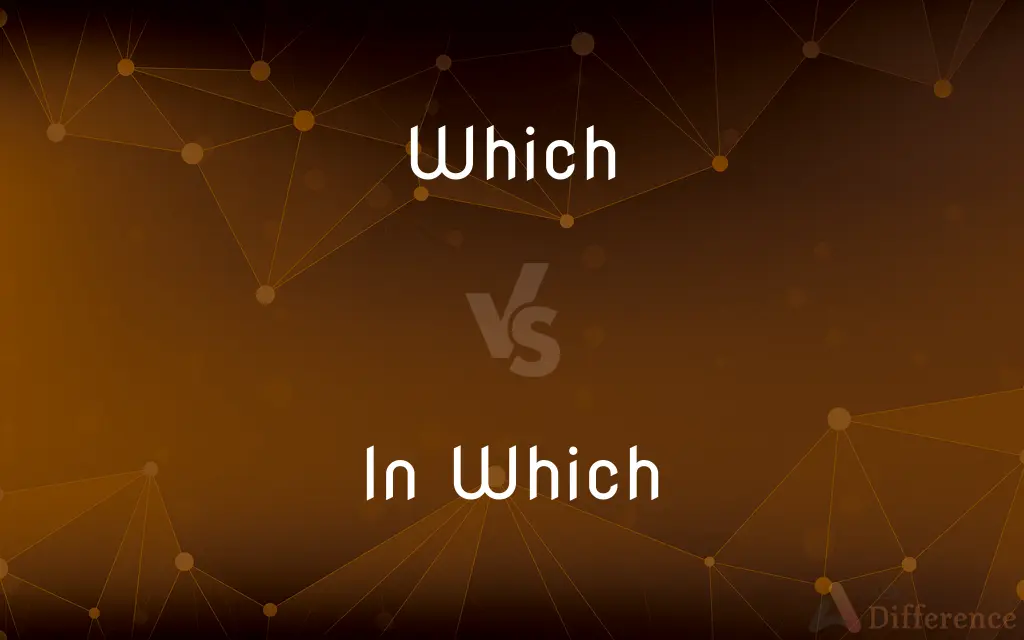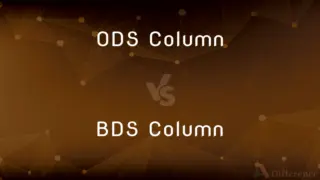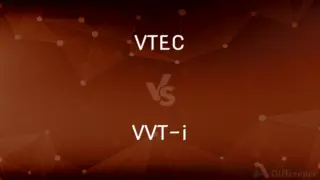Which vs. In Which — What's the Difference?
By Maham Liaqat & Fiza Rafique — Published on February 16, 2024
"Which" is used to introduce a clause specifying one or more items from a set. "In which" introduces clauses where "which" refers to a situation or context.

Difference Between Which and In Which
Table of Contents
ADVERTISEMENT
Key Differences
"Which" is a relative pronoun used to introduce relative clauses, providing additional information about a noun mentioned earlier in the sentence. It can refer to both people and things in specific or general contexts. For example, in the sentence "I have a book which is very old," "which" introduces a clause that gives more information about "a book."
"In which" is a variation where "which" is preceded by the preposition "in." This construction is often used to refer to a situation, place, or condition described in a previous part of the sentence, making the description more precise or formal. For example, "He wrote a novel in which the protagonist travels through time" uses "in which" to specify the context or setting within the novel.
The difference between "which" and "in which" essentially lies in the requirement of the preposition "in" to accurately convey the relationship between the relative clause and its antecedent. "In which" is preferred when the clause is explaining a situation or context that literally or figuratively involves being "in" something, such as a place, condition, or specific situation.
Choosing between "which" and "in which" depends on the grammatical context and the clarity of the sentence. While "which" can be used more broadly, "in which" is selected to avoid ambiguity, especially in written English, where clarity and precision are paramount. For instance, "the situation in which we found ourselves was unprecedented" clearly links the clause to "the situation" through the use of "in."
In summary, "which" introduces additional information about a noun, and "in which" is used when the information relates to being "in" a situation, place, or context. The choice between them affects the clarity and specificity of the information being conveyed, with "in which" often preferred in more formal or written English to precisely link the clause and its antecedent.
ADVERTISEMENT
Comparison Chart
Prepositional Requirement
Not required
Requires "in" to indicate context
Usage
General information about a noun
Specifies a situation or context
Contextual Specificity
Broad usage
Used for precise, often spatial, contexts
Formality
Used in both formal and informal contexts
Often preferred in formal writing
Example
"The book which I read was thrilling."
"The room in which we met was spacious."
Compare with Definitions
Which
Introduces a relative clause identifying things or people.
She found the keys which were lost.
In Which
Used to indicate the setting of an event.
The house in which the party was held is historic.
Which
Specifies one or more items from a known set.
Which of these desserts do you prefer?
In Which
Explains the particular instance or case.
The phase in which the moon is full is called the Full Moon.
Which
Used to add non-essential information.
His car, which is red, is very fast.
In Which
Refers to a specific condition or state.
The circumstances in which we met were unusual.
Which
Clarifies or adds detail to a subject.
The movie which we watched was exciting.
In Which
Defines the scenario being discussed.
The chapter in which the character dies was moving.
Which
Indicates a choice or distinction.
Which path will you take?
In Which
Introduces a clause specifying the context or situation.
He recalled the year in which he graduated.
Which
What particular one or ones of a number of things or people
Which part of town do you mean?.
Which
Any one or any number of; whichever
Use which door you please.
Which
Being the one or ones previously mentioned or implied
It started to rain, at which point we ran.
Which
(interrogative) What, of those mentioned or implied.
Which song shall we play?
They couldn't decide which song to play.
Which one is bigger?
Show me which one is bigger.
Which
The/Any ... that; whichever.
You may go which way you please.
Which
Designates the one(s) previously mentioned.
He once owned a painting of the house, which painting would later be stolen.
Yesterday, I met three men with long beards, which men I remember vividly.
For several seconds he sat in silence, during which time the tea and sandwiches arrived.
I'm thinking of getting a new car, in which case I'd get a red one.
Which
(interrogative) What one or ones (of those mentioned or implied).
Which is which?
By now, you must surely know which is which.
Which is bigger, the red one or the blue one?
I'm unable to determine which is bigger.
Which of these do you want to keep?
Which
The/Any ones that; whichever.
Please take which you please.
Which
(relative) Introduces a relative clause giving further information about something previously mentioned.
He walked by a door with a sign, which read: PRIVATE OFFICE.
I found my camera, which I thought I'd lost, under the bed.
No art can be properly understood apart from the culture of which it is a part.
He had to leave, which was very difficult.
Which
Used of people (now generally whom, that; which remains possible with words also referred to by it like baby, child).}}
Which
Of what sort or kind; what; what a; who.
And which they weren and of what degree.
Which
A relative pronoun, used esp. in referring to an antecedent noun or clause, but sometimes with reference to what is specified or implied in a sentence, or to a following noun or clause (generally involving a reference, however, to something which has preceded). It is used in all numbers and genders, and was formerly used of persons.
And when thou fail'st - as God forbid the hour! -Must Edward fall, which peril heaven forfend!
God . . . rested on the seventh day from all his work which he had made.
Our Father, which art in heaven.
The temple of God is holy, which temple ye are.
Which
A compound relative or indefinite pronoun, standing for any one which, whichever, that which, those which, the . . . which, and the like; as, take which you will.
Do not they blaspheme that worthy name by the which ye are called?
Common Curiosities
How is "in which" different from "which"?
"In which" specifies context or situation, often relating to being "in" something.
How do I decide whether to use "which" or "in which"?
Consider if the clause specifies a situation or place that involves "in."
Is "in which" more formal than "which"?
Yes, "in which" is often preferred in formal writing for clarity.
Can "which" refer to people?
It can, though "who" is more commonly used for individuals.
Are there cases where "in which" cannot replace "which"?
Yes, particularly when the clause does not involve a spatial or situational context.
Can "which" and "in which" be used interchangeably?
Not always; their use depends on whether the clause requires a prepositional context.
What is the function of "which" in a sentence?
It introduces a relative clause providing additional information about a noun.
Can "which" introduce essential information?
Yes, especially when it specifies something critical about the noun.
Is it incorrect to omit "in" from "in which"?
Omitting "in" changes the meaning and may lead to ambiguity.
Why might "in which" be preferred in academic writing?
For its precision in linking clauses to their antecedent situations or contexts.
What is a common mistake when using "which" and "in which"?
Using "which" without the necessary preposition for contexts that require "in which."
What role does punctuation play with "which"?
Commas often set off non-essential clauses introduced by "which."
Can "which" start a sentence?
Yes, in questions and in clauses providing additional information.
How does "in which" enhance readability?
By clearly specifying the relationship between the clause and its reference point.
How does context influence the choice between "which" and "in which"?
The specific situation, place, or context being described dictates the choice.
Share Your Discovery

Previous Comparison
ODS Column vs. BDS Column
Next Comparison
VTEC vs. VVT-iAuthor Spotlight
Written by
Maham LiaqatCo-written by
Fiza RafiqueFiza Rafique is a skilled content writer at AskDifference.com, where she meticulously refines and enhances written pieces. Drawing from her vast editorial expertise, Fiza ensures clarity, accuracy, and precision in every article. Passionate about language, she continually seeks to elevate the quality of content for readers worldwide.
















































